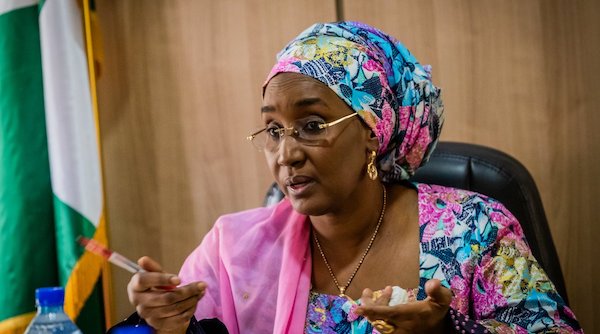News
People with more than N5,000 in their accounts can’t get COVID-19 palliatives —Nigerian govt

Nigerians with more than N5,000 in their bank accounts will not be included among the beneficiaries of the Federal Government’s palliatives intended to mitigate the effects of the lockdown imposed by government in the wake of the coronavirus outbreak.
Government also said it would use mobile networks to detect those who often top up their phones with airtime of N100 or less.
According to FG’s plan, state governments will now participate in the distribution of food items.
Hajiya Sadiya Farouq, Minister of Humanitarian Affairs and Disaster Management, said this while briefing newsmen after her meeting with President Muhammadu Buhari at the Presidential Villa in Abuja.
Mrs Farouq noted that the ministry would henceforth give priority attention to the urban poor in its execution of the directive on sharing of palliatives to Nigerians.
“You are aware that the President in his broadcast of Monday 13th April, directed that we expand the beneficiaries of the conditional cash transfer by one million and in this regard, we are going to focus more now on the urban poor.
“These are people who depend on the informal sector to earn their livelihood; they are daily wage earners and these are the people that we are really going to focus more on as well as people living with disabilities,” the minister said.
Read also: COVID-19: Nigerian govt admits incapacity to cater for 2,000 nationals who want to return home
She went further to say that the ministry had three strategies to adopt in determining the beneficiaries of the relief programme.
“Well, we have three options; one, we are going to use the national social register that we already have, two, we are also going to focus on the urban poor as I mentioned, by using their verified BVN accounts to get them, that is, people that have an account balance of N5,000 and below.
“We are also using the mobile networks, to know people that top up the credit units for their phones with may be N100 or less. Those are also people that we consider to be poor and vulnerable. So, these are the three options that we are exploring and I am sure that by the time we get this data we will be able to give this intervention.”
She continued, “Let me also say that we have a standard. 25 per cent of the total population is what we will take out. It cannot go round everywhere but we are starting from somewhere.
“25 per cent of let’s say the location of Lagos state for example is what is going to benefit from this intervention that we are doing. Going forward, we might expand it but this is what is obtainable for now.”
Join the conversation
Support Ripples Nigeria, hold up solutions journalism
Balanced, fearless journalism driven by data comes at huge financial costs.
As a media platform, we hold leadership accountable and will not trade the right to press freedom and free speech for a piece of cake.
If you like what we do, and are ready to uphold solutions journalism, kindly donate to the Ripples Nigeria cause.
Your support would help to ensure that citizens and institutions continue to have free access to credible and reliable information for societal development.
























